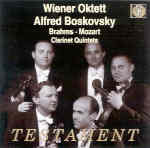Pairing the Brahms and Mozart Clarinet Quintets is something of a no-brainer since the two are the backbone of the clarinet-based chamber repertoire–and they fit neatly on a single disc. Both are late works (if anything by Mozart can be called “late”), and both were written for leading clarinetists of their day. Here they’re played by one of the top clarinetists of the 1950s and the string players of the Vienna Octet. They’re typical Vienna Octet performances: warm, middle-of-the-road interpretations overlaid with a surfeit of charm, now more a souvenir of a well-loved group than a viable first choice for contemporary collectors.
Alfred Boskovsky plays with an ingratiatingly warm, liquid tone whose midrange lacks ideal color. Both works are cut from the same interpretive cloth. Outer movements, in the Vienna Octet manner, want more energy, and slow movements sacrifice depth for charm. Musical points are understated, so in the Adagio movement of the Brahms the darker currents of the string tremolos under the clarinet line have neither dread nor expectancy. It’s impossible to discuss the Brahms work without using the word “autumnal”, but while it describes the players’ approach, their faded Brahmsian “leaves” are realized more through rhythmic stodginess than through tempo choices. The sunnier Mozart goes slightly better, but more thrustful playing and a less emotionally distanced approach, even within a classical framework, would have been welcome.
The same pairing in more energetic performances can be found in a DG disc of the Emerson Quartet with David Shifrin and on an older Philips disc with clarinetist Harold Wright. For the Brahms, no one should be without the vintage Reginald Kell/Busch Quartet version. In stereo, Sony’s David Oppenheim/Budapest Quartet reading reminds us that the Viennese way with this music was dated even in its own time, while the Karl Leister/Leipzig String Quartet version on MDG should interest those wanting a central European approach with more muscle than displayed by the Viennese. For the Mozart, my fondness for the George Pieterson/Arthur Grumiaux is undimmed.
































